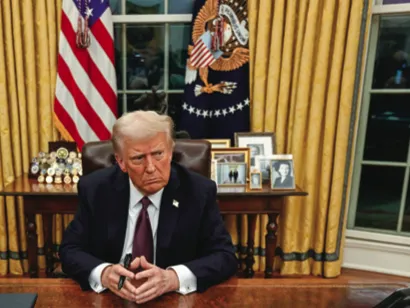New Delhi, Jun 20: US President Donald Trump has indicated he will decide on whether to launch a military strike on Iran “within the next two weeks,” suggesting a potential diplomatic pause even as regional violence intensifies.
Speaking through White House Press Secretary Karoline Leavitt on Thursday, Trump said the United States was weighing its options in light of possible diplomatic engagements with Tehran. “I have a message directly from the president, and I quote,” Leavitt told reporters: “Based on the fact that there’s a substantial chance of negotiations that may or may not take place with Iran in the near future, I will make my decision whether or not to go within the next two weeks.”
The announcement, described a signal that “opened a window of diplomacy and lowered the temperature in the region,” offers a rare moment of potential de-escalation after nearly a week of heightened hostilities between Iran and Israel.
For days, speculation had mounted that President Trump would act swiftly, with many media and analysts anticipating decision within 48 hours. But the two-week timeline, while not ruling out military action, offers breathing room for a flurry of diplomatic activity now unfolding across Europe.
Europe Pushes Diplomatic Track
On Friday, British Foreign Secretary David Lammy is expected to meet his French and German counterparts, as well as Iranian Foreign Minister Abbas Araghchi, in Geneva. The high-stakes talks, also to be attended by EU foreign policy chief Kaja Kallas as reported by BBC mark the first direct contact between Iranian and Western officials since the latest conflict between Iran and Israel erupted.
French Foreign Minister Jean-Noël Barrot said, as reported by the BBC, the meetings aimed to secure “a lasting rollback of Iran’s nuclear and ballistic missile programs.” In a post on X (formerly Twitter), Lammy added: “Now is the time to put a stop to the grave scenes in the Middle East and prevent a regional escalation that would benefit no one.”
While the outcome remains uncertain, the effort reflects growing urgency among European powers to curb a conflict that threatens to spill far beyond its current borders. Meanwhile, violence on the ground shows no signs of abating. Thursday marked the seventh consecutive day of cross-border strikes between Israel and Iran. Israeli authorities say an Iranian missile struck a hospital in Beersheba, injuring dozens. In response, Israeli warplanes have intensified their targeting of suspected Iranian nuclear facilities and command centres.
Trump’s decision to delay potential US military action is being interpreted by some as a calculated pause. What happens next may depend as much on the restraint of regional players as on backchannel diplomacy in Geneva and Washington.








